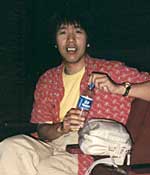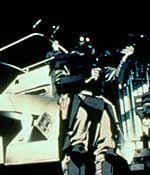
by Luis Reyes
High on a US theatrical release of "Jin-Roh," the North American DVD release of "Blood" later this month, and in the throes of an eagerly anticipated "Ghost in the Shell 2," Production I.G is enjoying a successful year. At the wheel of this sojourn into world wide fame sits the energetic president of the company, Mitsuhisa Ishikawa, the "I" of Production I.G Akadot spoke at length with Ishikawa right before the official premiere of "Jin-Roh" in Long Beach, California this past May. Free spirited and jovial, Ishikawa is a poster child for sartorial relaxation in his bright red button-up, opened to reveal a yellow T-shirt, and loose fit khakis that bunch up around the mouth of his loafers when he stands. When he sits, the pants hike up to reveal bright pink socks. We wander into the theater in which "Jin-Roh" will screen three hours from now and Ishikawa lounges without pretension across three seats excited to speak about I.G's work and its people. What better way to get some insight on anime professionals than to talk to their boss? I opened with a question about "Jin-Roh" writer Mamoru Oshii and "Jin-Roh" director Hiroyuki Okiura. How would you compare Oshii's style of directing to Okiura's style? Mitsuhisa Ishikawa: Oshii likes dogs. Okiura likes animation, and he likes girls, but he's doesn't care much for dogs. The only date sequence between Fuse and Kei that Oshii wrote into the script was a trip to the planetarium in which the two of them gaze at the constellations. They focus on one of a dog and spend something like ten minutes talking about the constellation of the dog. Oshii likes it so much and he thought that those were the best lines in the script, this metaphorical dialogue about dogs. Okiura hated that scene. He was like, "What the hell! This is not a love scene!" So without telling Oshii, Okiura completely cut that out of the script, and instead added a whole new scene with the couple at a rooftop carnival looking up at the sky.
What was the working relationship between Oshii and Okiura? MI: Once the script was written, Oshii gave it to Okiura and completely left it up to him without any further input.
Is Oshii happy with the final product? MI: Yes, despite being pissed off and never being able to forgive Okiura about cutting Oshii's dog constellation scene, he still thinks it's a great movie. Oshii believes no one else but Okiura could have done such a high-quality film.
Do they have a kind of teacher student relationship? MI: It's not a teacher student relationship at all. Okiura respects Oshii as a director. But if a suggestion was made to Okiura, he's not the type that would listen. He only makes what he wants to make and won't listen to anyone else. Once the project was done, Oshii said, "Oh my gosh, I have made a terrible rival for myself."
So, Oshii feels responsible for making Okiura the way he is?
MI: Out of hundreds of anime directors, Oshii thinks that there are only a few that are rivals, like Miyazaki. Now he feels Okiura is at that same level. "Jin-Roh" is his first directorial effort and now he's up there on Oshii's rival list. So he respects and fears him. When Miyazaki watched "Jin-Roh" he said, "I hate this film. This film should not have been made. But when Oshii and I are long gone, Okiura will still be around carrying out Japanese animation." Miyazaki gave Okiura this compliment.
Does Miyazaki influence Okiura? Would he ever make the kind of films for which Miyazaki is famous? MI: There is a possibility that he would make something for kids, but he is actually driven to make something that people his age can watch and get into. With Okiura's skill level, he could probably do something targeted at kids, but he would probably prefer to keep making films that can entertain adults.
How do you feel about the dying breed of directors? Do you feel that the art of directing animation is waning? MI: There have never been any more than a handful of great directors in the field of animation. That isn't something that's changed over time. But I feel that the animators are starting to get old. There aren't any young animators entering the industry and being developed. Japan is becoming kind of like the US. Much of the animation is being out-sourced. The key animation is done in Japan, but the rest elsewhere. We can bring in young animators, but if they have no place to train -- no place to practice doing the movement animation, the in-between animation -- then there's no way for them to grow and develop along artistic lines. There's no way for them to grow into great animators.
|


